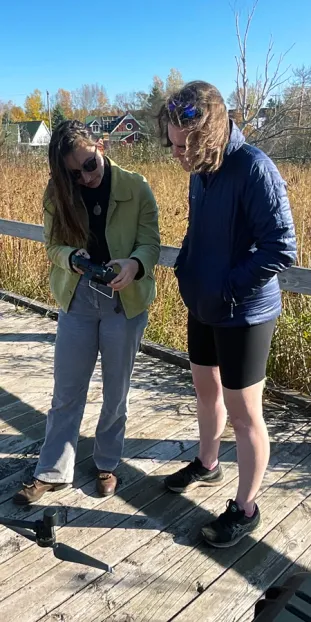
Program Overview
Do you wish to develop technical skills in a growing professional field? Would you like to acquire specialized training to meet current or future job requirements calling for GIS knowledge? If so, then our Geographic Information Science and Technology (GIST) program is for you. You will develop the skills and experience to succeed in one of the top emerging professions.
By using geographical data and advanced computer technology, students in the Geographic Information Systems & Technology major will learn to assemble, manipulate, analyze, and visualize spatial data to solve problems and make decisions. Our faculty help students gain familiarity with cartography, spatial and statistical analysis, computer science, remote sensing, and Global Positioning Systems (GPS) to prepare for careers as technicians, analysts, programmers, database managers, consultants, or planners. Students will build foundational knowledge in Geographic Information Systems and then choose their focus through electives. They may follow a more applied focus with training in surveying, drafting, or landscape/environmental change, or they may follow a programming- and database-intensive path by completing coursework in computer programming, web services and application development, and database management.

Learning Objectives
- Identify and describe fundamental properties and the utility of a Geographic Information System (GIS), as well as the theories underpinning GIS.
- Explain fundamental GIS data types, tools, and analysis methods, as well as the types of sources and repositories of geographic information.
- Manage, collect, and analyze spatial data for the purposes of communicating geographic information using a variety of GIS, remote sensing, and computer programming software.
- Create documents, maps, and presentations based upon the collection and analysis of spatial data for the purposes of visualization, problem-solving, and decision-making.

Skills and Competencies
As in most other fields, strong interpersonal communications and organizational skills are a must for any professional. Some other valuable skills and competencies specific to a profession in GIST are leadership capabilities, critical thinking, organization, mapping, spatial analysis, statistical analysis, and remote sensing and data analysis.

What can you do with a GIST degree?
This program helps students prepare for employment in many careers including, but not limited to, the following:
- Cartographer
- Consultant
- Geographer
- Geoscientist
- GIS Analyst
- Landscape Architect
- Mapping Technician
- Natural Resources Specialist
- Photogrammetrist
- Planner
- Researcher
- Resource Manager
- Surveyor
Affiliated Faculty


Adam Naito
Assistant Professor
anaito@nmu.edu 906-227-1174Office Location:
3007 Weston Hall
Geographic Information Science & Technology Major Requirements
Geographic Information Science & Technology Core 38 Credits
- CS 101 - Web Site Construction [INTT] 4 Credits
- GC 100 - Physical Geography [SCII] 4 credits or
- GC 101 - Introduction to Environmental Science [INTT] 4 credits or
- GC 164 - Human Geography [SOCR] [GC] 4 credits
- GC 205 - Introduction to Geographic Research 4 Credits
- GC 225 - Introduction to Maps 2 Credits
- GC 235 - Quantitative Methods 4 Credits
- GC 335 - Geographic Information Systems 4 Credits
- GC 337 - Cartographic Design 4 Credits
- GC 425 - Remote Sensing 4 Credits
- GC 428 - Spatial Analysis 4 Credits
- GC 489 - Human-Environment Capstone 4 Credits or
- GC 488 - Earth and Environmental Science Capstone Research 4 Credits
Electives 12 Credits
Choose 12 credits from the following:
- CN 254 - Construction Survey and Layout 3 Credits
- CS 120 - Computer Science I [QUAR] 4 Credits
- CS 122 - Computer Science II 4 Credits
- CS 201 - Programming in C++ 3 Credits
- CS 202 - Python 4 Credits
- CS 222 - Data Structures 4 Credits
- CS 365 - Client-Side Web Programming 4 Credits
- CS 465 - Server-Side Web Programming 3 Credits
- DATA 309 - Data Visualization and Programming in R 4 Credits
- DD 100 - Technical Drafting with Introduction to CAD 4 Credits
- GC 412 - Database Development 4 Credits
- GC 431 - Landscape Dynamics and Analysis 4 Credits
- GC 491 - Internship 2-6 Credits
Notes:
This major does not require a minor.
Where Have Our GIST Students Interned?
The following is a partial listing of organizations and businesses where our have interned.
- Ceiba Foundation—GIS assistant for Reforestation Project in Ecuador
- City of Marquette—GIS assistant
- Marquette Board of Light and Power—GIS/Distribution Engineering Intern
- Marquette County Equalization Department—GIS assistant
- Marquette County Planning Department—planning assistant
- The Nature Conservancy—preserve steward; GIS and data analyst to study vegetation change
- Ottawa County GIS Department—GIS intern
- Paces AI, Inc.—GIS intern
- Upper Peninsula Power Company—GIS support



Declaring the GIST Major
We strongly encourage you to meet with one of our Senior Success Advisors in EEGS before declaring the major, as they can provide valuable guidance and will work with you to develop a degree plan. Our Success Advisors are:
- Ruth Abbott (rabbott@nmu.edu; schedule a meeting)
- Lauren Anargyros (lanargyr@nmu.edu; schedule a meeting)
- Jennifer Mital (jmital@nmu.edu; schedule a meeting)
- Susan Robison (surobison@nmu.edu; schedule a meeting)
When you are ready to declare:
- You may submit your request to change a major or a minor on the web on the Change or Declare a Major page.
- Enter your name, NMU IN, email address, class standing, check the "change my major" box, and input any additional relevant comments.
- Submit the declare request.
You may also visit the Student Success Office in 3302 C.B. Hedgcock Building to make the change in person.
